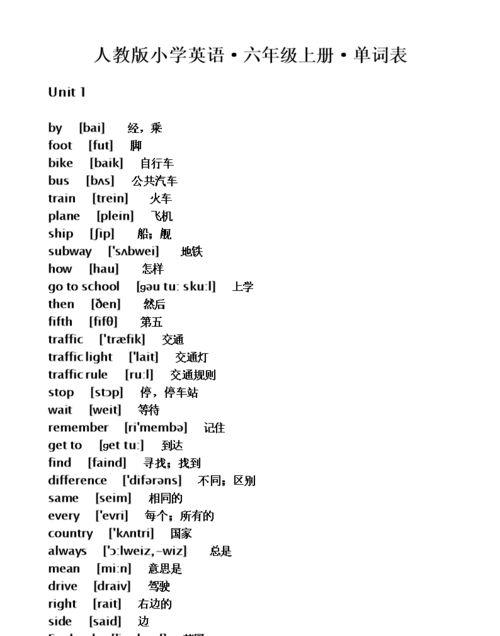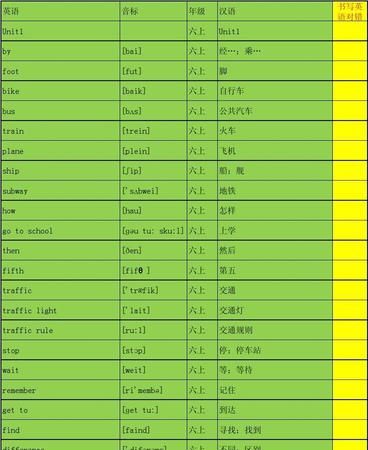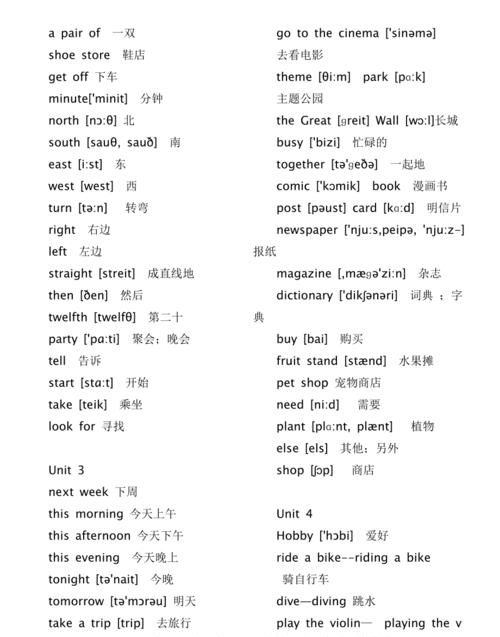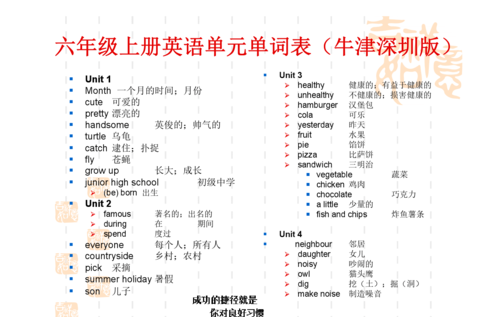本文目录
人教版六年级上册英语单词
六年级第一学期英语单词
Module 1名 词 kilometer 公里,可以 place 地方,地点 building建筑物 metre 米
数 词 million百万,百万个 thousand一千
动 词 might 可能
短 语 the Summer Palace 颐和园 how old 多久
the Great Wall 长城 how long 多长 more than …多
Module2名 词 Chinatown 唐人街 dancing 舞蹈 restaurant 饭馆 weekend 周末
yesterday 昨天 stone 石头 surprise 惊奇
动 词 might 可能
副 词 everywhere 各处到处
形容词 different 不同的
短 语 the Ming Tombs 明陵(十三陵) New York 纽约
Module3名 词 stamp 邮票 album 集邮册 America 美国 Canada 加拿大 coconut 椰子 England 英格兰
动 词 collect 收集
形容词 favourite 最喜爱的
Module4名 词 present 礼物 festival 节日 Thanksgiving 感恩节 Christmas 圣诞节 poem 诗
动 词 hear 听到听见
形容词 special 特殊的,特别的 important 重要的
副 词 nearly 几乎接近 差不多 together 一起
Module 5名 词 address 地址 summer 夏天
形容词 pretty 漂亮的 pleased 高兴的,满足的foreign 外国的 短语 pen pal 笔友
Module6名 词 chopsticks 筷子 city 城市 question 问题 knife 刀 fork 叉子 sandwich 三明治
动 词 answer 回答 finish 完成结束 start 开始
形容词 difficult 困难的 短语 half past …点半
Module 7名 词 bamboo 竹子 child 孩子 snake 蛇 flute 笛子
动 词 copy 模仿 sleep 睡觉
形容词 awake 醒的deaf 聋的
短 语 CD-ROM 电脑光盘 at night 在晚上 come out 出来
Module 8 名 词 bookshelf 书架week 星期,周 副词 often 常常,经常
动 词 tidy 整理,收拾 choose 选择 形容词 messy 脏乱的
短 语 every week 每周 tidy the room 整理房间 suck one’s thumb 嘬手指
read books 读书 go to the library 去图书馆
Module 9 名词 peace 和平 world 世界 kangaroo 袋鼠 children 孩子们 parrot 鹦鹉
动词 visit 参观
介 词 inside 在…之内
短 语 the UN building 联合国大厦 make peace 维持和平 in the world 在世界上
Module 10 名 词 way 方式,方法 line 排,列
形容词 thirsty 口渴的 beautiful 美丽的 动 词 bring 拿来,带来
短 语 have a picnic 野餐 of course 当然 drink water 喝水
be quite 安静 stand in line 站队
六年级第一学期英语句型
Moudle One 1. How long is the Great Wall? 长城有多长?
It’s ten thousand li long. 它有万里长。
2. How old is the Great Wall? 长城建了多少年了?
It’s more than two thousand years old. 它有两千多年的历史了。
Moudle Two 1. There is a big Chinatown in New York. 纽约有个很大的唐人街。
2. I went to a library yesterday. 昨天我去了图书馆。
Module Three Have you got any stamps from China? 你有中国邮票吗?
No, I haven’t. (Yes, I have.) 不,我没有。(是的,我有。)
Module Four 1. Can you tell me about American festivals?你能给我讲讲美国节日吗?
Yes. Thanksgiving is my favourite. 可以。我最喜欢感恩节。
2. Families are together. 家家团聚。
3. We have a big,special dinner. 我们吃丰盛的、特殊的晚餐。
4. It’s a very important festival. 它是个非常重要的节日。
Module Five 1 Can I write to her? 我能给她写信吗?
Yes. You can write to her in English. 行啊。你可以用英语给她写信。
2. I want a Chinese pen pal. 我想要个中国笔友。
Module Six 1. I’ve got some Chinese chopsticks. 我有中国筷子。
2. I haven’t got a book about America. 我没有有关美国的书。
Module Seven 1. What food do you love? I love noodles. 你喜欢吃什么东西?我喜欢吃面条。
2. Do you love hamburgers? No, I don’t. 你喜欢吃汉堡吗?不,我不喜欢。
3. Pandas love bamboo. 熊猫喜欢吃竹子。
4. A child sleeps for eight hours a night. 小孩子一个晚上要睡八个小时。
Module Eight 1. Do you often tidy your room? Yes, I do.(No, I don’t.) 你经常整理房间吗?
2. I often help my mum. 我经常帮妈妈干家务。
Module Nine 1. A: Do you want to visit the UN building? 你想参观联合国大楼吗?
B: Yes, please. 是的,我想。
A: The UN wants to make peace in the world. 联合国想维护世界和平。
2. What do you like doing? I like singing. 你喜欢做什么? 我喜欢唱歌。
Module Ten 1. Only drink clean water! 只喝干净水。
2. Stand in line! 站队。 3. Be quiet! 安静!
4. Don’t make so much noise! 别大声吵闹! 5. Turn left! 向左转。
6. Turn around! 转圈。 7. Turn right! 向右转。

搜300个小学英语单词怎么说
pen 钢笔 pencil 铅笔 pencil-case 铅笔盒 ruler 尺子 eraser 橡皮 crayon 蜡笔book 书 bag 书包 sharpener 卷笔刀 school 学校head 头face 脸nose 鼻子mouth 嘴eye 眼睛ear 耳朵arm 胳膊finger 手指 leg腿foot 脚body 身体red 红色的yellow 黄色的green 绿色的blue 蓝色的 purple 紫色的white 白色的black 黑色的orange 橙色的pink 粉色的brown 棕色的cat 猫dog 狗monkey 猴子panda 熊猫rabbit 兔子duck 鸭子pig 猪bird 鸟bear 熊elephant 大象mouse 老鼠squirrel 松鼠cake 蛋糕bread 面包hot dog 热狗hamburger 汉堡包chicken 鸡肉French fries 榨薯条Coke 可乐juice 果汁milk 牛奶water 水tea 茶coffee 咖啡one 一two 二three 三four 四five 五six 六seven 七eight 八
nine 九ten 十doll 玩具娃娃boat 小船ball 球kite 风筝
balloon 气球car 小汽车plane 飞机boy 男孩 girl 女孩teacher 教师student 学生this 这个my 我的friend 朋友I’m=I am 我是nice 好的;愉快的good morning 早上好good afternoon 下午好meet 遇见;碰见goodbye 再见too 也;太
father 父亲;爸爸dad 爸爸(口语)mother 母亲;妈妈mom 妈妈(口语)man男人woman 女人grandmother (外)祖母
grandma (口语)(外)祖母grandfather (外)祖父
grandpa (口语)(外)祖父sister 姐妹brother 兄弟
let’s=let us 让我们great 太好了really 真地;确切地and 和;并且how 多么;怎么样
eleven 十一twelve 十二thirteen 十三fourteen 十四fifteen 十五sixteen 十六seventeen 十七eighteen 十八nineteen 十九twenty 二十how many 多少can 能够;可以look at 看;瞧
peach 桃pear 梨orange 橙子watermelon 西瓜apple 苹果
banana 香蕉strawberry 草莓grape 葡萄like 喜欢some 一些;某些thanks 多谢
bus 公共汽车bike 自行车taxi 出租车jeep 吉普车desk 课桌
chair 椅子walkman 随身听lamp 台灯your 你的;你们的
zoo 动物园small 小的big 大的long 长的short 短的;矮的tall 高的
giraffe 长颈鹿deer 鹿Window(窗户) board(板) light(灯) picture(图片) door(门) floor(地板) classroom (教室) computer(电脑) teacher’desk(讲台) wall(墙) fan(扇子)
bag(包) pencil(铅笔) pen(钢笔) book (书) ruler(尺子) pencil-case(铅笔盒)
teacher(教师) student(学生) boy(男孩) girl(女孩) friend(朋友)
home(家) room(房间) school(学校) classroom(教室)
window(窗户) desk(课桌;书桌) door(门) chair(椅子) bed(床)
rice(米饭) beef(牛肉) bread(面包) milk(牛奶) egg(蛋)
water(水) chicken(鸡肉) fish(鱼)sister(姐妹) brother(兄弟) father(父亲;爸爸) mother(母亲;妈妈)
driver(司机) doctor(医生) farmer(农民) nurse(护士)
computer(计算机) board(写字板) fan(风扇) light(灯)
this(这;这个) is(是)my(我的) that(那;那个) your(你的)
teacher’s desk(讲台) picture(图画;照片) wall(墙壁) floor(地板) yes(是;是的) it(它)
one(一) two(二) three(三) four(四) five(五) six(六) seven(七) eight(八) nine(九) ten(十) what(什么) time(时间)
it’s=it is …o’clock(…点钟) math(数学) Chinese(语文) English(英语) P.E.(体育) music(音乐) for(为;给) class(课程)
jacket(夹克衫) shirt(衬衫) skirt(裙子) dress(连衣裙)
T-shirt(T恤衫) red(红色的) blue(蓝色的) yellow(黄色的)
green(绿色的) white(白色的) no(不;不是) not(不;不是的) colour(颜色)
warm(暖和的) cold(寒冷的) cool(凉爽的) today(今天)
jeans(牛仔裤) pants(长裤) socks(袜子) shoes(鞋子) let’s=let us play(玩;踢) football(足球) snowy(下雪的) sunny(晴朗的)
how much(多少钱) big(大的) small(小的) long(长的) short(短的) apple(苹果) banana(香蕉) pear(梨) orange(橙子) watermelon(西瓜) are(是) they 它(他、她)们
horse(马) aren’t=are not cat(猫) rabbit(兔子) pig(猪) duck(鸭子) dog(狗) eleven(十一) twelve(十二) thirteen(十三) fifteen(十五) twenty(二十) how many(多少) there(那儿;那里)Young (年轻的) funny (滑稽可笑的) tall (高的)
strong (强壮的) kind (和蔼的;亲切的) old (年老的)
short (矮的)thin (瘦的) Mr (先生)
like (像;喜欢) strict (严格的) smart (聪明的;巧妙的) active (积极的;活跃的) quiet (安静的;文静的)
very (很;非常) but (但是)Monday (星期一) Tuesday (星期二) Wednesday (星期三)
Thursday (星期四) Friday (星期五) Saturday (星期六)
Sunday (星期天) day (天;日子) have (有;吃)
on (在…..时候) do homework (做作业)
watch TV (看电视) read books (读书) eggplant (茄子) fish (鱼) green beans (青豆) tofu (豆腐) potato (土豆) tomato (西红柿) for (为;给)
lunch (中餐;午饭) we (我们) tasty (好吃的)
sweet (甜的) sour (酸的) fresh (新鲜的)salty (咸的)
favourite (最喜爱的;特别喜爱的) they are (他们是)
fruit (水果) grape (葡萄)Cook the meals (倒垃圾) water the flowers (浇花)
sweep the floor (扫地) clean the bedroom (打扫卧室)
make the bed (铺床) set the table (摆饭桌)
wash the clothes (洗碗碟) do the dishes (收拾衣服)
use a computer (使用计算机)curtain (空调) trash bin (垃圾箱) closet (壁橱)
mirror (镜子) end table (床头柜) bedroom (卧室)
kitchen (厨房) bathroom (卫生间) living room (客厅)
in (在…里面) on (在…上面) under (在…下面)
near (在..旁边) behind (在…后边) clothes (衣服)river (河流) flower (花) grass (草) lake (湖泊)
forest (森林) path (路) park (公园) picture (照片)
house (房子) bridge (桥) tree (树) road (公路)
building (建筑物) clean (干净的)do morning exercises(晨练) eat breakfast(吃早饭)
have English class(上英语课) play sports(进行体育运动)
eat dinner(吃晚饭) when(什么时候) evening(夜晚;晚上)
get up(起床) at(在…点钟) usually(通常;一般)
noon(中午) climb mountains(爬山)
go shopping(购物;买东西)
play the piano(弹钢琴) visit grandparents(看望祖父母)
go hiking(去远足) weekend(周末) often(经常)
sometimes(有时候)spring(春天) summer(夏天) fall(秋天) winter(冬天)
season季节) which(哪一个) best(最;极) swim(游泳)
fly kites(放风筝) skate(滑冰;滑冰鞋)
make a snowman(堆雪人) plant trees(种树) why(为什么) because(因为) sleep(睡觉)
Jan./January(一月) Feb./February(二月)Mar./March(三月)
Apr./April(四月) May(五月) June(六月)
July(七月) Aug./August(八月) Sept./September(九月)Oct./October(十月) Nov./November(十一月)
Dec./December(十二月) birthday(生日)
uncle(叔叔;舅舅) her(她的) date(日期)
cook dinner(做饭) read a book(看书)
answer the phone(接电话) listen to music9(听音乐)
clean the room(打扫房间) write a letter(写信)
write an e-mail(写电子邮件) mom(妈妈)grandpa(爷爷;外公)study(书房)
fly(飞) jump(跳) walk(走) run(跑) swim(游泳)
kangaroo(袋鼠) sleep(睡觉) climb(往上爬) fight(打架)
swing(荡;荡秋千) drink water(喝水)
take pictures(照相) watch insects(观察昆虫)
pick up leaves(采摘树叶) do an experiment(做实验)
catch butterfly(捉蝴蝶) honey(蜂蜜) count insects(数昆虫)
collect leaves(收集树叶) write a report(写报告)
play chess(下棋)have a picnic(举行野餐)
by (经,乘) foot(脚) bike(自行车) bus(公共汽车) train(火车) how(怎样) go to school(上学) traffic(交通)
traffic light(交通灯) traffic rule(交通规则) stop(停,停车站)wait(等待) get to(到达)
library(图书馆) post office(邮局) hospital(医院) cinema(电影院) turn(转弯) bookstore(书店) where(在哪里,到哪里) please(请) next to(与…相邻) right (右边) left(左边) straight(成直线地) then (然后)
next week(下周) this morning(今天上午) this afternoon(今天下午)
this evening (今天晚上) comic book(漫画书) post card(明信片) newspaper(报纸) buy(购买) hobby(爱好) ride a bike--riding a bike(骑自行车) dive--diving(跳水)
play the violin—playing the violin(拉小提琴)
make kites—making kites(制作风筝)
collect stamps—collecting stamps(集邮) live –lives(居住) teach--teaches(教) go--goes(去) watch--watches(看) read--reads(读,看) does doesn’t=does not
singer(歌唱家,歌手) writer(作家) actor(男演员) actress(女演员) artist(画家) TV reporter(电视台记者) engineer(工程师) accountant(会计) policeman(男警察) salesperson(销售员)
cleaner(清洁工) where(在哪里,到哪里) work(工作)
rain(雨) cloud (云) sun(太阳) stream(河,溪) come from(来自,从…来) seed(种子) soil(土壤) sprout (苗,芽) plant(植物,种植) should (应该) then(然后)
tall—taller更高的 short—shorter 更矮的 strong—stronger 更强壮的 old—older 年龄更大的 young—younger 更年轻的
big—bigger 更大的 heavy—heavier 更重的 long—longer 更长的 thin—thinner 更瘦的 small—smaller (体型)更小的
have a fever 发烧 have a sore throat喉咙疼 have a cold感冒
have a toothache 牙疼 have a headache 头疼
matter事情,麻烦 sore 疼的 hurt疼痛 nose 鼻子
tired疲劳的,累的 excited兴奋的 angry生气的 happy高兴的 bored无聊的,烦人的 sad 忧伤的,悲伤的
=======希望您采纳,谢谢

人教版六年级下册英语单词表
PEP六年级下册四会单词词汇表
Unit 1
tall—taller更高的 short—shorter 更矮的 strong—stronger 更强壮的 old—older 年龄更大的 young—younger 更年轻的 big—bigger 更大的heavy—heavier 更重的 long—longer 更长的 thin—thinner 更瘦的 small—smaller (体型)更小的
Unit 2
have a fever 发烧 have a sore throat喉咙疼 have a cold感冒 have a toothache 牙疼 have a headache 头疼 matter事情,麻烦 sore 疼的 hurt疼痛 nose 鼻子 tired疲劳的,累的 excited兴奋的 angry生气的 happy高兴的 bored无聊的,烦人的 sad 忧伤的,悲伤的
Unit 3
watch—watched 看 wash—washed 洗 clean—cleaned打扫 play—played玩 visit—visited 看望 do—did last weekend 上一个周末 go—went去 go to a park—went to a park 去公园 go swimming—went swimming去游泳 go fishing—went fishing去钓鱼 read—read 读 go hiking—went hiking 去郊游
Unit 4
leran Chinese—learned Chinese学汉语 sing and dance—sang and danced 唱歌和跳舞 eat good food—ate good food吃好吃的食物 take pictures—took pictures 照相 climb—climbed 爬 have—had buy presents—bought presents买礼物 row a boat—rowed a boat 划船 see elephant—saw elephant 看大象 go skiing—went skiing 去滑雪 go ice-skating—went ice-skating 去滑冰 how怎么,如何 get—got 到达 last 上一个的,仅余的,留在最后的
参考资料:http://220.202.29.65/ReadNews.asp?NewsID=2077

人教版六年级下册的英语单词表图片
PEP六年级上册四会单词词汇表
Unit 1:by (经,乘) foot(脚) bike(自行车) bus(公共汽车) train(火车) how(怎样) go to school(上学) traffic(交通) traffic light(交通灯) traffic rule(交通规则) stop(停,停车站)wait(等待) get to(到达)
Unit 2:library(图书馆) post office(邮局) hospital(医院) cinema(电影院) bookstore(书店) where(在哪里,到哪里) please(请) next to(与…相邻) turn(转弯) right (右边) left(左边) straight(成直线地) then(然后)
Unit 3:next week(下周) this morning(今天上午) this afternoon(今天下午) this evening (今天晚上) comic book(漫画书) post card(明信片) newspaper(报纸) buy(购买)
Unit 4: hobby(爱好) ride a bike--riding a bike(骑自行车) dive--diving(跳水) play the violin—playing the violin(拉小提琴) make kites—making kites(制作风筝) collect stamps—collecting stamps(集邮) live –lives(居住) teach--teaches(教) go--goes(去) watch--watches(看) read--reads(读,看) does doesn’t=does not
Unit 5:singer(歌唱家,歌手) writer(作家) actor(男演员) actress(女演员) artist(画家) TV reporter(电视台记者) engineer(工程师) accountant(会计) policeman(男警察) salesperson(销售员) cleaner(清洁工) where(在哪里,到哪里) work(工作)
Unit 6:rain(雨) cloud (云) sun(太阳) stream(河,溪) come from(来自,从…来) seed(种子) soil(土壤) sprout (苗,芽) plant(植物,种植) should (应该) then(然后)
PEP六年级下册四会单词词汇表
Unit 1:tall—taller更高的 short—shorter 更矮的 strong—stronger更强壮的 old—older 年龄更大的 young—younger 更年轻的 big—bigger更大的heavy—heavier 更重的 long—longer 更长的 thin—thinner 更瘦的 small—smaller (体型)更小的
Unit 2:have a fever 发烧 have a sore throat喉咙疼 have a cold感冒 have a toothache 牙疼 have a headache 头疼 matter事情,麻烦 sore 疼的 hurt疼痛 nose 鼻子 tired疲劳的,累的 excited兴奋的 angry生气的 happy高兴的 bored无聊的,烦人的 sad 忧伤的,悲伤的
Unit 3:watch—watched 看 wash—washed 洗 clean—cleaned打扫 play—played玩 visit—visited 看望 do—did last weekend上一个周末 go—went去 go to a park—went to a park 去公园 goswimming—went swimming去游泳 go fishing—went fishing去钓鱼 read—read 读 go hiking—went hiking 去郊游
Unit 4:leran Chinese—learned Chinese学汉语 sing and dance—sang and danced 唱歌和跳舞 eat good food—ate good food吃好吃的食物take pictures—took pictures 照相 climb—climbed 爬 have—had buy presents—bought presents买礼物 row aboat—rowed a boat 划船 see elephant—saw elephant 看大象 go skiing—went skiing 去滑雪 go ice-skating—wentice-skating 去滑冰 how怎么,如何 get—got 到达 last上一个的,仅余的,留在最后的

以上就是关于人教版英语300个单词六年级 ,人教版六年级上册英语单词的全部内容,以及人教版英语300个单词六年级 的相关内容,希望能够帮到您。

